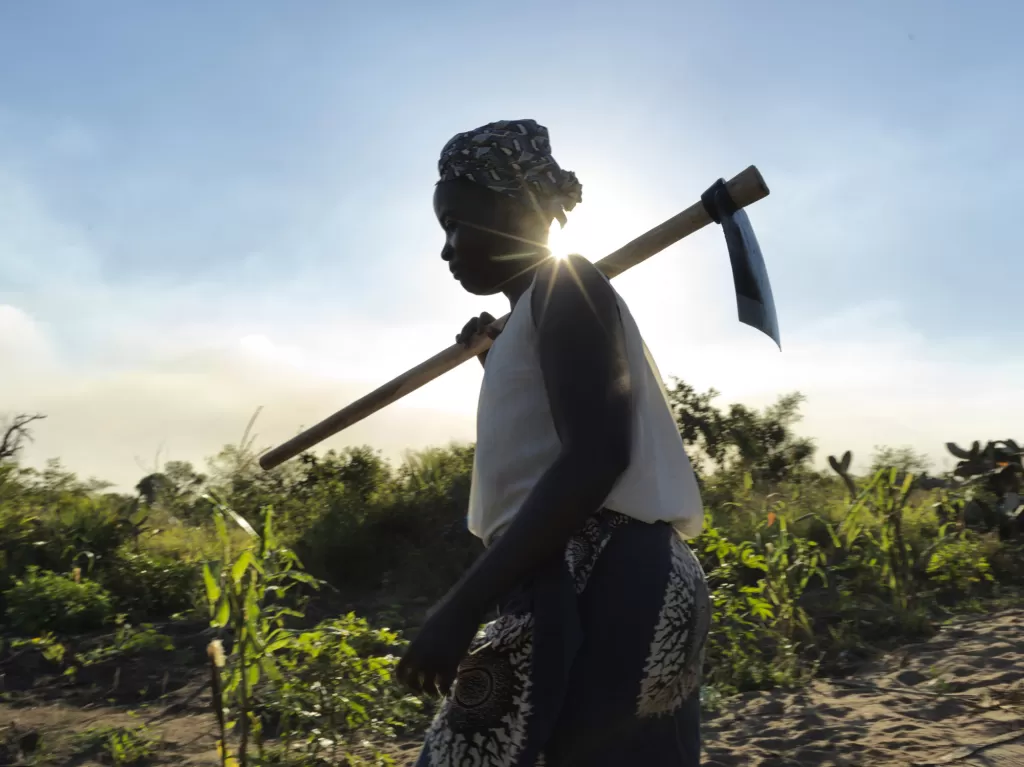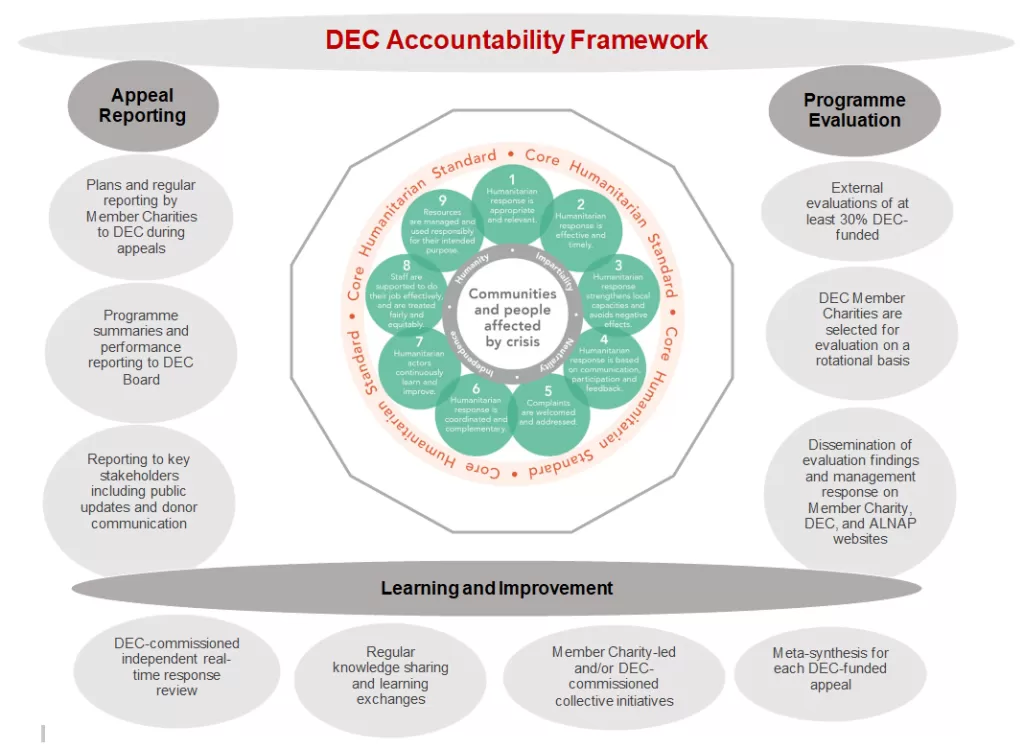

Accountability
Framework
Accountability
Framework
DEC members have adopted the Core Humanitarian Standard on Quality and Accountability as part of the DEC accountability framework.
As part of their drive to improve quality of performance, members have agreed an Accountability Framework. It is DEC’s responsibility to continuously review and maintain a framework that reflects the highest quality standards in the sector, and it is each individual member’s responsibility to meet the standards when delivering aid and to provide evidence to the DEC that standards are met.
The DEC Accountability Framework encompasses a number of activities designed to promote and demonstrate accountability, learning and improvement. The four pillars of the framework are: quality standards audit; appeal-specific reporting; a system of independent external evaluation of programmes; and learning and improvement activities.
You can read more about the DEC’s approach to assurance on safeguarding here.

Member charities are challenged to provide assurance through independent verification against The Core Humanitarian Standard on Quality and Accountability (CHS). This means that, as well as holding members to account for delivering individual disaster responses, the DEC asks them to examine their ways of working across all humanitarian work and to strengthen the systems which underpin their ability to consistently deliver the effective responses that disaster survivors need.
Programme reporting and evaluations drill down on specific DEC-funded humanitarian operations, asking questions about how well member agencies utilise tranches of DEC funding; while joint learning activities – be they member-led or facilitated by the DEC Secretariat – provide an opportunity for members to generate evidence, share learning and improve.
What is the Core Humanitarian Standard?
The Core Humanitarian Standard on Quality and Accountability (CHS) sets out Nine Commitments that organisations and individuals involved in humanitarian response can use to improve the quality and effectiveness of the assistance they provide.
The CHS describes the essential elements of principled, accountable and high-quality humanitarian action. All DEC members make a commitment to apply the CHS and to provide external assurance of measurable progress in its implementation through the CHS Verification Scheme.
What is the CHS Verification Scheme?
Verification is a structured, systematic process to assess the degree to which an organisation is making progress to achieve the CHS. The Verification Scheme is managed by the CHS Alliance. It sets out the policies and rules of the verification process to ensure it is conducted in a fair and consistent manner.
To avoid potential conflicts of interest and following international good practice, the independent auditing is undertaken by a certification body established for this purpose which totally independent from the CHS Alliance, the CHS standard setting process and the organisations it audits. Currently the only such organisation is the Humanitarian Quality Assurance Initiative.
DEC members’ status against the CHS
To check the status of the DEC members against the CHS, please follow this link, where you will also be able to download the summary audit reports on the certification or verification undertaken by the Humanitarian Quality Assurance Initiative.
The following DEC members (a part of or all of their wider federation / confederation as indicated in the audit report) have been verified against the CHS or certified to conform to the requirements of the CHS, or are in the planning process:
- Action Against Hunger (independently verified)
- ActionAid UK (independently verified)
- Age International (independently verified)
- British Red Cross (independently verified)
- CARE International UK (independently verified)
- CAFOD (certified)
- Christian Aid (certified)
- Concern Worldwide (certified)
- International Rescue Committee UK (completed self-assessment)
- Islamic Relief Worldwide (certified)
- Oxfam International (certified)
- Plan International UK (independently verified)
- Save the Children (independently verified)
- Tearfund (certified)
- World Vision UK (completed self-assessment)
Until the adoption of the CHS in 2015, the DEC applied an earlier version of the DEC Accountability Framework (DECAF).
2013-14 DEC ACCOUNTABILITY FRAMEWORK ASSESSMENT
The report DEC Accountability Self-Assessment Validation 2013-14 (PDF) was prepared for the DEC by consultants from One World Trust who validated members’ self-assessed performance against 21 Ways of Working (PDF) which DEC members are committed to following.
Although this process can seem very abstract and distant from front line aid work, the DEC and its members believe it is extremely important because it helps ensure that the lessons we learn from experience and evaluation get locked into the way we work in future. This is important because it means agencies do not rely exclusively on the personal experience of staff to ensure we learn from the past and it allows for continuous improvement.
This year each member agency had its self assessments for five ways of working closely scrutinised to verify the accuracy of member agency self assessment procedures. The five ways of working checked for each agency were selected from a pool of eight criteria:
- Documented processes are in place at the appropriate level governing the use and management of funds
- Programme design and procurement processes maximise value for money – balancing quality, cost and timeliness at each phase of the response
- Programmes respond to clearly defined needs and are adjusted as needs change
- Staff and partners understand and integrate agreed standards into their programmes
- A defined and documented accountability framework is in place governing accountability to disaster affected populations
- Information on agency background, programme timelines, beneficiary entitlements and selection criteria is communicated to disaster affected populations
- Disaster affected populations participate in programme assessments, design, implementation and evaluation
- Key learning (including from evaluations) is incorporated into processes and programmes in a systematic and timely manner.
There will be no external validation next year as DEC Trustees have agreed this should become a biennial process. Agencies will however undertake a self-assessment and report on the improvements they have made over the year. The framework is being updated to reflect the outcomes of the Core Humanitarian Standards process. An earlier review implemented in 2011-12 led to a raising of the bar, strengthening and widening the expectations within the ways of working and the current developments are expected to do the same.
2012-13 DEC ACCOUNTABILITY FRAMEWORK ASSESSMENT
This report DEC Accountability Self-Assessment Validation 2012-13 (PDF) validates the self assessments of DEC member agencies against a sample of the 21 ways of working that make up the DEC Accountability Framework. It was produced by One World Trust and reviews and analyses evidence submitted by the DEC’s 14 member agencies to demonstrate how their work in two emergency responses complies with the following five ways of working:
- Approach to the management and care of staff reflects People in Aid code of good practice
- Local structures (including governments, civil society organisations and markets) are consulted and strengthened
- Agencies participate in established coordination mechanisms and support their partners to do the same
- Agencies shall work with partners to strengthen their capacity to be accountable to disaster affected populations
- Key learning is effectively communicated to staff, partners and other stakeholders
The review found that all the member self assessments were accurate and the One World Trust said it was confident that self assessments across the remainder of the 21 ways of working would also be accurate.
The review report said “The One World Trust believes that the DEC accountability framework is a leader in humanitarian standards and by striving to refine and improve both its content and methodology of assessment it will continue to offer a valuable tool for improvement of the DEC member agencies”.
The main innovation in the report this year was that rather than reporting collectively on the level of member agency compliance, the performance of each agency against each way of working is now listed individually. The DEC member agencies agreed to this change to increase transparency.
2011-12 DEC ACCOUNTABILITY FRAMEWORK ASSESSMENT